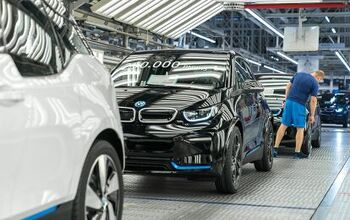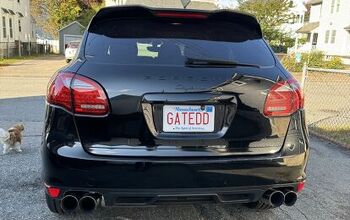Expanded Production in U.S. Hinges on Trump Trade Decision, Volkswagen Hints

Volkswagen’s sole U.S. assembly plant was spared any fallout from the company’s wildly expensive diesel emissions scandal, but the upcoming North American Free Trade Agreement negotiations could see VW throttle back its future plans for the facility.
The Chattanooga plant, which builds the Passat and Atlas, has seen $900 million in investment over the last couple of years. More models are anticipated, and the automaker said it expects the plant to reach full production by 2020. However, recent threats of an import tax to be levied on German automakers has VW brass in wait-and-see mode before sending any new models or money to Tennessee.
Volkswagen brand chief Herbert Diess made a telling remark outside yesterday’s unveiling of the Arteon luxury sedan in Germany, Bloomberg reports.
“It has been a roller-coaster of emotions over the past months,” Diess said. “We hope that we’re going to have clarity in the next months. It influences investment decisions.”
Diess was referring to rhetoric emanating from the Trump administration, which hopes to redraw NAFTA in a manner that prioritizes U.S. workers and industry. One way it could do that is to levy an import tax on foreign automakers. That would be bad news for an automaker that imports the bulk of the vehicles it sells in the U.S. from factories in Mexico and Europe.
Before any new investment occurs in the U.S., Diess and other top brass want to know the U.S.’s intentions.
Chattanooga took on a larger presence in VW’s global portfolio following the diesel debacle. As a way to boost revenue and sales, the automaker plans to offer new crossover and SUV models to a utility-hungry America. Some of those vehicles, as well as the company’s future crop of electric vehicles, were expected to find a production home in an American plant.
“We will be significantly stepping up our activities in the USA,” Diess said in a statement last November, emphasizing a focus on SUVs. “In a second stage, we will then take our new electric cars to North America.”
Those electric vehicles, which share the same architecture as its I.D. concept vehicles, would appear in 2021, Diess said at the time. NAFTA talk are expected to get underway in August.
[Image: Volkswagen]

More by Steph Willems
Latest Car Reviews
Read moreLatest Product Reviews
Read moreRecent Comments
- Kjhkjlhkjhkljh kljhjkhjklhkjh [h3]Wake me up when it is a 1989 635Csi with a M88/3[/h3]
- BrandX "I can charge using the 240V outlets, sure, but it’s slow."No it's not. That's what all home chargers use - 240V.
- Jalop1991 does the odometer represent itself in an analog fashion? Will the numbers roll slowly and stop wherever, or do they just blink to the next number like any old boring modern car?
- MaintenanceCosts E34 535i may be, for my money, the most desirable BMW ever built. (It's either it or the E34 M5.) Skeptical of these mods but they might be worth undoing.
- Arthur Dailey What a load of cow patties from fat cat politicians, swilling at the trough of their rich backers. Business is all for `free markets` when it benefits them. But are very quick to hold their hands out for government tax credits, tax breaks or government contracts. And business executives are unwilling to limit their power over their workers. Business executives are trained to `divide and conquer` by pitting workers against each other for raises or promotions. As for the fat cat politicians what about legislating a living wage, so workers don't have to worry about holding down multiple jobs or begging for raises? And what about actually criminally charging those who hire people who are not legally illegible to work? Remember that it is business interests who regularly lobby for greater immigration. If you are a good and fair employer, your workers will never feel the need to speak to a union. And if you are not a good employer, then hopefully 'you get the union that you deserve'.































Comments
Join the conversation
What the hell is up with that photo? Those are not Appalachian mountains. Looks like SoCal mountains. Probably up near Valencia just north of LA. Weird that they put a wall with the name of the town in Tennessee where they have their US plan in the middle of SoCal.
THANK YOU MR PRESIDENT! WE'LL SHOW THOSE GERMANS WHO WON THE WAR!